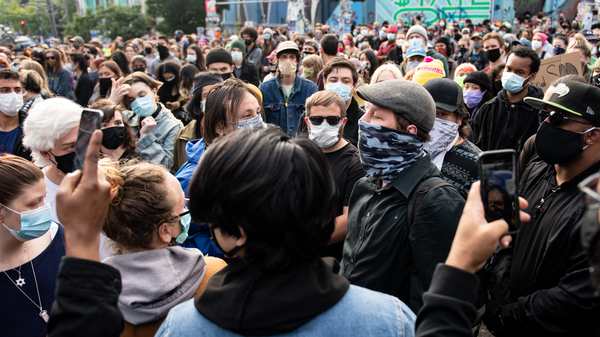 | Noah Riffe | Anadolu Agency via Getty Images
June 26, 2020
Parties, not protests, are causing COVID-19 spikes | |
|
|
|
Happy Friday morning to you. Here’s what you need to know heading into the weekend. Like yesterday, I’m going to give you more reason not to party this weekend. First, weather.
Cloudy and rainy. Twin Cities have a 50 percent chance of showers and thunderstorms before a mostly sunny afternoon with highs in the upper 80s and 10 to 15 mph winds. Statewide, a chance of rain and storms with highs from the upper 70s to mid-80s. More on Updraft | Forecast
.
Nationwide protests over George Floyd’s killing are not driving spikes in COVID-19 cases. What is causing the clusters across the country: partying. Take this example from Washington state: "We did have a rally in Bellingham, which is our county seat, and there was also a protest, and we have not been able to connect a single case to that rally or to the protest , and what we're finding is in large part that's due to the use of masks," Erika Lautenbach, the director of the Whatcom County Health Department, told NPR. "Almost everyone at the rally was wearing a mask, and it's really a testament to how effective masks are in preventing the spread of this disease."
In Minnesota, protests haven’t caused a spike either. The Health Department has offered free testing in Twin Cities over the past two weeks. The positive rate has been less than 2 percent, low enough to suggest coronavirus has not spread from protests in the way health officials initially feared.
However, there was the outbreak tied to bars we wrote about yesterday. And we now have an idea of where it happened. While state health officials wouldn’t specify where the outbreak was, Blue Earth County reported a surge of 91 cases since June 20, nearly all in an age range of 19 to 25. The biggest city in Blue Earth County is Mankato.
Here are the latest coronavirus statistics:
- 34,123 cases confirmed (365 new) via 542,696 tests
- 1,406 deaths (9 new)
- 3,943 cases requiring hospitalization
- 336 people remain hospitalized; 162 in intensive care
- 29,854 patients no longer needing isolation
Who’ll be the first to get a COVID-19 vaccine? Probably those living in the country where it was developed. The U.S., China and Britain collectively have about a dozen different vaccines in various testing stages and several wealthy countries have ordered millions of doses of those experimental vaccines , the AP reports. Dr. Anthony Fauci, the top infectious disease expert in the U.S., said he’s cautiously optimistic there will be a COVID-19 vaccine by the end of this year or early next year.
The World Health Organization is creating guidelines for ethically distributing vaccines, when available. However, it’ll vary how vaccines get doled out in individual countries. In the U.S., officials have said they’re developing a tiered system for distributing vaccines, likely prioritizing key workers and populations at greatest risk of severe complications from the virus.
New research shows the unprecedented challenges COVID-19 is posing for reproductive health. A study from the reproductive rights advocacy group Guttmacher Institute found that 34 percent of women are delaying pregnancy or having fewer children due to the coronavirus. Many women are also struggling to access birth control during the pandemic.
Reproductive health issues in the pandemic are especially high for people of color. Thirty-eight percent of Black women and 45 percent of Latinas struggled to access birth control. For white women, that figure was 29 percent.
— Cody Nelson, MPR News | @codyleenelson |
|
|
|
|